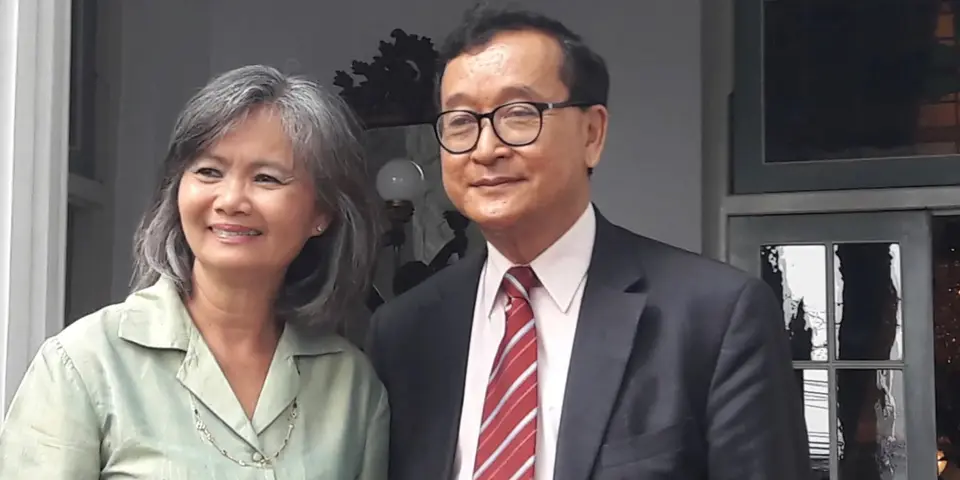
Parliamentarians call for the immediate release of Mu Sochua and an end to Cambodia’s relentless assault on dissent
November 07, 2019

JAKARTA, 7 November 2019 – Regional lawmakers called for the immediate and unconditional release of Mu Sochua, Vice-President of Cambodia’s main opposition party, following her detention by Malaysian authorities at Kuala Lumpur airport, and called for all ASEAN countries to respect the fundamental freedoms of Cambodian citizens.
“Sochua should be immediately released from detention and allowed to continue her peaceful activities. The decision to detain her is a complete disregard for ASEAN’s stated commitment to democracy and human rights. We all know that any attempts to block Cambodian opposition members from returning to their countries is solely based on political grounds and is a blatant attempt to silence their voices,” said Kasit Piromya, former Thailand MP and Board Member of ASEAN Parliamentarians for Human Rights (APHR).
The Malaysian authorities should allow access to independent monitors to visit her and the two Cambodian youth opposition activists who have been detained at the airport for the past three days and clarify under which law the three of them are currently detained, said APHR.
In preparation for his return to Cambodia, Sam Rainsy, Cambodia’s opposition leader, is also expected to be refused entry into Thailand when he tries to board a plane in Paris this evening.
“It is outrageous that Malaysia and other ASEAN countries are doing the dirty bidding of their counterparts fearful of legitimate political opposition. They should not be following the orders of Hun Sen’s repressive regime and violating Cambodian citizens’ fundamental rights on his behalf,” said Kasit Piromya.
Over the past few months, Hun Sen’s crackdown on opposition members and activists has intensified ever since exiled leaders of the CNRP who have been facing charges for allegedly “plotting” and “inciting to commit a felony” vowed to return to Cambodia on 9 November, Cambodia’s Independence Day.
Ahead of their planned return, the authorities announced that it had sent arrest warrants for CNRP co-founder Sam Rainsy to all neighboring countries, deployed troops along the Cambodian-Thailand border, and threatened to use armed forces to ‘suppress’ the opposition, raising fears of possible violence.
The authorities also stated that civil aviation authorities would face “serious consequences” if commercial airlines act as “accomplices to a coup attempt” and in a clear violation of their rights, admitted to surveilling the phones of opposition members, alleging their capacity to find the exact time and location of their return.
Meanwhile, to supposedly ‘protect their sovereignty,’ the Cambodian authorities have been filing charges and arresting anyone who shows support both online and offline for the CNRP leaders’ return. More than 50 opposition members have been detained and arrested in recent weeks. Many were arrested without a warrant and without being informed of the reason for their arrest, but have good reason to believe that their arrests were merely due to their political affiliation.
By using all means to prevent the return of the political opposition to Cambodia and detaining all potential threats to his power, Hun Sen once again shows how Cambodia has become a one-man authoritarian regime that totally disregards democracy.
“Hun Sen is so afraid of losing power that he has waged an unrelenting and systematic attack on the opposition,” said Walden Bello, former Philippine MP and APHR Board Member. “The large-scale crackdown on dissent and refusal to let opposition leaders return to their country should be a wake-up call to the international community that Cambodia is in a democratic crisis.”
The Cambodian authorities have been systematically and repeatedly violating their obligations to respect the right to freedom of expression and peaceful assembly. APHR reminds Cambodia that it is a state party to the International Covenant on Civil and Political Rights which under Articles 19 and 25 guarantees the right to freedom of expression and to participate in public affairs.
The authorities’ systematic crackdown on critical voices contributes to instilling a climate of fear among the public, forcing many political and human rights activists to self-censor or hide from the authorities. APHR called on the international community to take all available measures to ensure Cambodia upholds its commitments to human rights and end its crackdown on legitimate political opposition and human rights activists.
“Without a strong opposition or human rights defenders able to independently and freely comment on Hun Sen’s rule and policies, there is nobody providing checks and balances on the executive. No one should fool themselves: Cambodia is now nothing but a fully-fledged dictatorship – nothing in the current functioning of the country remains democratic,” said Charles Santiago, Malaysian MP and APHR Chair.
“The international community, including Cambodia’s ASEAN neighbors, have a responsibility to ensure opposition voices in Cambodia are free to exercise their human rights without fear of reprisals.”
Background:
Following significant gains in commune-level elections by the CNRP in 2017, Cambodian authorities detained CNRP President Kem Sokha on 3 September 2017 on trumped-up charges and several CNRP members fled the country in fear of arrests. To this day, Kem Sokha remains under house arrest. In November 2017, a Supreme Court ruling dissolved the CNRP for allegedly attempting to overthrow the government, and banned 118 of its members from politics for five years. In July 2018, Cambodia hold widely discredited elections in which the CNRP was not allowed to compete. As a consequence, Hun Sen’s ruling Cambodian People’s Party (CPP) currently holds all 125 of the seats in Parliament.
ASEAN Parliamentarians for Human Rights (APHR) was founded in June 2013 with the objective of promoting democracy and human rights across Southeast Asia. Our founding members include many of the region's most progressive Members of Parliament (MPs), with a proven track record of human rights advocacy work.